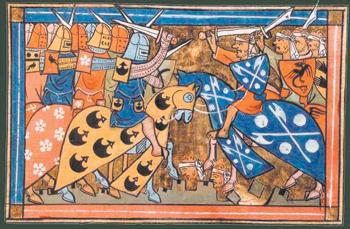 When Ben Franklin offered that bit of advice from Poor Richard, he may have been thinking about the Knights Templar. Today, we climb into the Way Back Machine with Mr. Peabody to visit Medieval Times between the 1100s and the 1300s. Back then, knighthood was in flower. The Crusades were all the rage for the cool kids in Europe. Yep, it’s another history lesson from the thrilling days of yesteryear, even before the Lone Ranger rode the range.
When Ben Franklin offered that bit of advice from Poor Richard, he may have been thinking about the Knights Templar. Today, we climb into the Way Back Machine with Mr. Peabody to visit Medieval Times between the 1100s and the 1300s. Back then, knighthood was in flower. The Crusades were all the rage for the cool kids in Europe. Yep, it’s another history lesson from the thrilling days of yesteryear, even before the Lone Ranger rode the range.
Come with us now to the year 1118, when a French Knight named Hugh des Payens founded the Knights Templar. Hugh was chilling in Jerusalem, Israel, which was chronically jabbed by the local Moslems. Hugh decided to found an order of religious warrior monks to take up arms to protect travelers heading to the Holy Land. He started his own army, the Knights Templar.
De Payens was like Col. Walter E. Kurtz in the movie “Apocalypse Now.” Kurtz was way out in the Cambodian jungle refusing to take orders from his commanders and sowing destruction according to his plans. The general who sent Captain Willard to terminate Kurtz’s command described Kurtz as follows: “He’s out there operating without any decent restraint, totally beyond the pale of any acceptable human conduct. And he is still in the field commanding troops.”
Two hundred years after the Templara were founded, King Phillip IV of France felt the same about the Templara.
De Payens was a good organizer. He started with nine knights. By the time the Knights Templar reached its maximum size, there were tens of thousands of Templara organized into a standing army. No less an authority than the internet reports, the Templara had more than 15,000 Templar houses spread across Europe in the 1300s. The Templara project was to protect pilgrims heading from Europe to Jerusalem and to protect Jerusalem from the Moslems.
Pope Urbanus declared the first crusade in 1095 to keep Jerusalem out of Moslem hands. That crusade went pretty well. The crusades that followed, not so much. In the third crusade, the Templara threw an air ball and were defeated soundly by the Moslems, who were playing on their home court.
The Templara regrouped and still had the strongest army in Europe. They concluded that crusading wasn’t all it was cracked up to be. They needed a new line of work. Naturally, they decided to go into banking. Recall Woody Guthrie’s famous line: “Some will rob you with a six gun/ And some with a fountain pen.”
The Templara figured getting killed by Moslems wasn’t as financially rewarding as banking by robbing folks with a fountain pen. They came up with a system of banking by accepting deposits that allowed everyone from kings to serfs to borrow and send money from one location to another. This made the Templara enormously rich. They had more money than most kings. Everything was dandy for a while. What could go wrong?
If you have a lot of money, other people may think they ought to have your money. Enter King Phillip IV of France.
Phil was always warring with other kings. Wars cost money. Phil went to his local Bank of Templara and borrowed a potful of money. Borrowing money is fun. Paying it back is not so much fun. If you borrow money from the Russian mafia, they will expect you to pay it back, otherwise bad things may happen to you. It was no different in the Middle Ages.
Phil borrowed a ton of money from the Templara, who incidentally had an army. They expected him to pay it back. Phil really didn’t want to pay it back. This presented a conundrum. What to do?
Phil devised a strategy. He sent out his army to arrest all of the Templara at once and charged them with heresy. Like the FBI raiding Roger Stone’s house, Phil put the Templara on double-secret probation. He sent out his troops to arrest all the Templara in the early morning hours of Friday, Oct. 13, 1307. This was an unlucky day for the Templara. Since then, Friday the 13th has gotten a bad rap.
After some enhanced interrogation techniques, the Templara confessed to all sorts of gruesome things, including heresies and bad manners. Their property was seized. Phil’s war debt to the Templara was cancelled. You don’t have to repay heretics, particularly dead or imprisoned heretics.
The Templar Grand Master was Jacques de Molay. After some not-so-gentle questioning by the Inquisition, he admitted to everything. Jacques spent about seven years in prison before he was finally slowly burned at the stake for his alleged crimes. Before leaving this mortal coil, Jacques laid a mighty curse on King Phil and Pope Clement IV, telling them they would all die within a year and a day of Jacques’ death. Sure enough, Phil and Clement both expired within the time limit set by Jacques.
So, what have we learned today? There is more money to be made in banking than in being the guys who fight wars. Money can’t buy happiness, but it can rent it. If you borrow money, you better pay it back. Ben Franklin was right.

 How to resolve AdBlock issue?
How to resolve AdBlock issue? 








